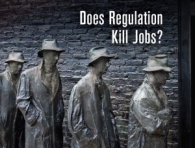 The question of whether regulations to protect public health have hurt employment has been very prominent over the past few years. One study found that the use of the phrase “job-killing regulations” increased in the media by over 17,000 percent between 2007 and 2011. A new book Does Regulation Kill Jobs looks at the relationship between employment and regulation (particularly environmental regulation). A chapter by Bloustein School professor Stuart Shapiro argues that the process for writing regulations is not well equipped for incorporating analysis of employment effects. Instead this important question should be given to a new agency that works on finding the answers to complex questions that cut across many regulations. For more on Professor Shapiro’s chapter see the blog post here.
The question of whether regulations to protect public health have hurt employment has been very prominent over the past few years. One study found that the use of the phrase “job-killing regulations” increased in the media by over 17,000 percent between 2007 and 2011. A new book Does Regulation Kill Jobs looks at the relationship between employment and regulation (particularly environmental regulation). A chapter by Bloustein School professor Stuart Shapiro argues that the process for writing regulations is not well equipped for incorporating analysis of employment effects. Instead this important question should be given to a new agency that works on finding the answers to complex questions that cut across many regulations. For more on Professor Shapiro’s chapter see the blog post here.
